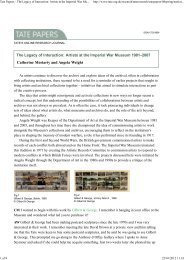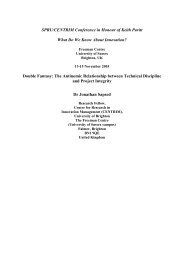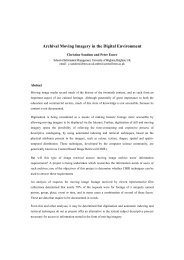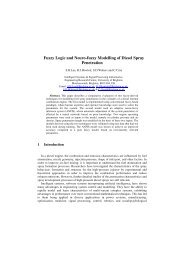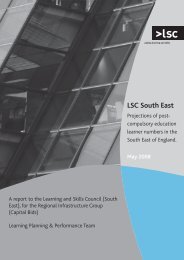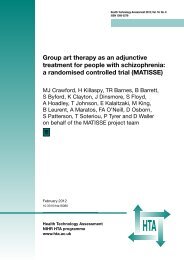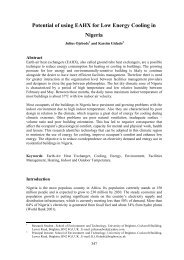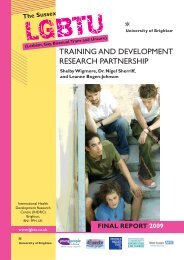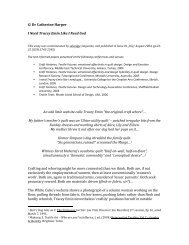TOP TIP - University of Brighton Repository
TOP TIP - University of Brighton Repository
TOP TIP - University of Brighton Repository
Create successful ePaper yourself
Turn your PDF publications into a flip-book with our unique Google optimized e-Paper software.
infocus<br />
Working with School-Age<br />
Fathers<br />
Health Initiatives Team, Leeds – The<br />
Health Initiatives Team’s at Education Leeds<br />
works city-wide with schools and other<br />
agencies to ensure that school-age parents<br />
(mothers and fathers) are able to access<br />
appropriate education, ensuring that<br />
educational achievement is not<br />
disadvantaged by pregnancy or parenthood.<br />
In 2004, the Team developed the post <strong>of</strong><br />
Specialist Learning Mentor for Teenage<br />
Fatherhood with funding from Connexions,<br />
Sure Start (Plus), and Education Leeds. The<br />
role involves working with school-age fathers<br />
and the male teenage partners <strong>of</strong> school-age<br />
mothers to identify both the support needs <strong>of</strong><br />
teenage fathers, and how agencies in Leeds<br />
can alter their practice to become more<br />
‘young father-friendly’. Together with the<br />
Childcare Coordinator, the Mentor started<br />
running a weekly after school group (FACT;<br />
Fathers and Children Together), where<br />
school-age young fathers and fathers-to-be<br />
can come together for some mutual support<br />
and have access to an experienced childcare<br />
specialist.<br />
FACT (Fathers And Children Together)<br />
With 3 dedicated workers (one specialist<br />
learning mentor and two nursery nurses),<br />
FACT is based around social issues such as<br />
housing, health issues, and parenting. The<br />
group <strong>of</strong>fers support through peers and<br />
brings in guest speakers from other agencies<br />
to <strong>of</strong>fer specialist knowledge on a variety <strong>of</strong><br />
topics (e.g. ranging from NHS speakers such<br />
as a teenage pregnancy midwife and sexual<br />
health worker, to the local council providing<br />
talks on car seat safety). For those in contact,<br />
young fathers are encouraged to bring along<br />
their babies as it is recognised as <strong>of</strong>ten being<br />
the only time they get to spend with their<br />
babies on a one-to-one basis without anyone<br />
interfering. For those who can’t bring their<br />
baby to the group, other fathers in the group<br />
‘share’ their babies so all members can<br />
practice their parenting skills and join in the<br />
activities.<br />
Occasional (low cost) day trips are <strong>of</strong>fered<br />
(e.g. visits to the library, local parks, and to<br />
see Santa) and locations chosen deliberately<br />
to ensure that they are in very public places<br />
in order to both raise the pr<strong>of</strong>ile <strong>of</strong> teenage<br />
fathers, increase the young father’s<br />
confidence about being a father in public,<br />
and challenge negative perceptions regarding<br />
parenting competence <strong>of</strong> young fathers. In<br />
2003-4, approximately 14 school-age fathers<br />
accessed the service rising to 24 during<br />
2005/6.<br />
Learning Points:<br />
‘Ticking boxes doesn’t work,<br />
because it doesn’t challenge the<br />
culture surrounding young fathers<br />
work … you’ve got to be passionate<br />
about what you do and be able to<br />
challenge other pr<strong>of</strong>essionals’<br />
views…’<br />
• The immediate impact <strong>of</strong> appointing a<br />
Specialist Learning Mentor for Teenage<br />
Fatherhood was that many young fathers<br />
and young fathers-to-be engaged with the<br />
support <strong>of</strong>fered by Education Leeds much<br />
more than before, and felt able to be much<br />
more open about their support needs.<br />
Moreover, referrals from schools and other<br />
agencies have increased, and many young<br />
mothers have expressed keen interest in<br />
introducing their partner to the Specialist<br />
Learning Mentor.<br />
• Experience has shown that work with<br />
young fathers does not need to cost a<br />
great deal <strong>of</strong> money. Large expensive<br />
celebration type events are unsustainable<br />
and do not lead to increased engagement.<br />
Guest speakers (e.g. for FACT, and SRE<br />
programmes in schools) are <strong>of</strong>ten willing to<br />
speak for free as part <strong>of</strong> their pr<strong>of</strong>essional<br />
developmental role.<br />
• Workers need to be comfortable in<br />
challenging attitudes and beliefs about<br />
school-age fathers. For example, why do<br />
you think he shouldn’t play a fathering role,<br />
why is he an undesirable influence on this<br />
child?<br />
• Some specific learning from FACT has<br />
revealed that that running the group at the<br />
same time (directly after-school) and on<br />
the same day every week is important as it<br />
provides a sense <strong>of</strong> continuity and stability<br />
for young fathers who may have rather<br />
PROMISING PRACTICE<br />
chaotic lifestyles. Providing a father-friendly<br />
environment where the group is held (e.g.<br />
displaying photos <strong>of</strong> the young fathers and<br />
their babies themselves) is easy to create<br />
and helps young men feel that the service<br />
is for them.<br />
• Although the after-school group FACT is<br />
essentially a pilot activity that is a part <strong>of</strong><br />
the broader work <strong>of</strong> Education Leeds in<br />
terms <strong>of</strong> its contribution to the local<br />
Teenage Pregnancy partnership, it does<br />
provide a positive example <strong>of</strong> what a<br />
forward thinking agency and effective<br />
partnership can do.<br />
Contacts: John May (Specialist Learning<br />
Mentor for Teenage Fatherhood) or Jenny<br />
Midwinter (Sexual Health Initiatives<br />
Coordinator), Tel: +44(0)113 395 1215<br />
Ladz 2 Dadz, Northamptonshire<br />
Funded by Northampton and Heartlands<br />
PCTs, the Ladz 2 Dadz project is an<br />
integrated element <strong>of</strong> the mainstream<br />
services <strong>of</strong>fered by the Northamptonshire<br />
County Council’s Teenage Parent Support<br />
Team. The service for young fathers and<br />
young fathers-to-be was established in April<br />
2006 and <strong>of</strong>fers advice, support and positive<br />
encouragement to young fathers aged<br />
between 14-21 years (including those who<br />
may be ‘looked after’ in residential or foster<br />
care). The aim <strong>of</strong> the project is to help young<br />
fathers to meet their own, and their<br />
babies’/children’s basic physical, social and<br />
emotional needs.<br />
Work is varied, individually tailored, and<br />
focuses on issues such as employment,<br />
education and training, parenting skills,<br />
legal/welfare rights, housing and benefits.<br />
The intensity <strong>of</strong> support and specific delivery<br />
methods are flexible and depend on the<br />
circumstances presented. Project workers<br />
meet the young man in a location <strong>of</strong> his<br />
choice, wherever he feels most comfortable.<br />
Access to the service is via a referral from<br />
anyone including the young father themselves<br />
who feel the service will enhance the<br />
opportunities available to the young father<br />
and/or their child. Since April 2006, 25<br />
young men have accessed the service, three<br />
<strong>of</strong> whom are currently <strong>of</strong> compulsory schoolage.<br />
Contact: Heather Frick<br />
(Teenage Parents Support Team Manager),<br />
Tel: +44 (0)1933 231 050<br />
‘… YOUNG FATHERS AT SCHOOL ARE SO INVISIBLE, IT’S REALLY<br />
DIFFICULT TO FIND OUT WHO THEY ARE.’<br />
Supporting Young Fathers 21



